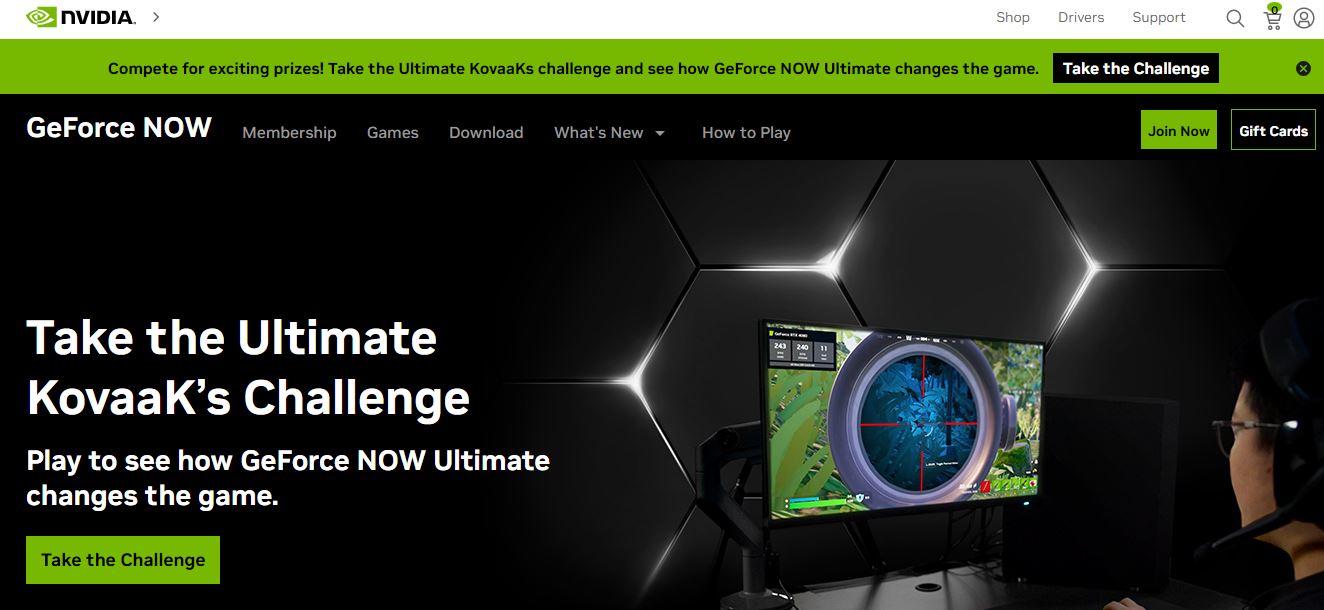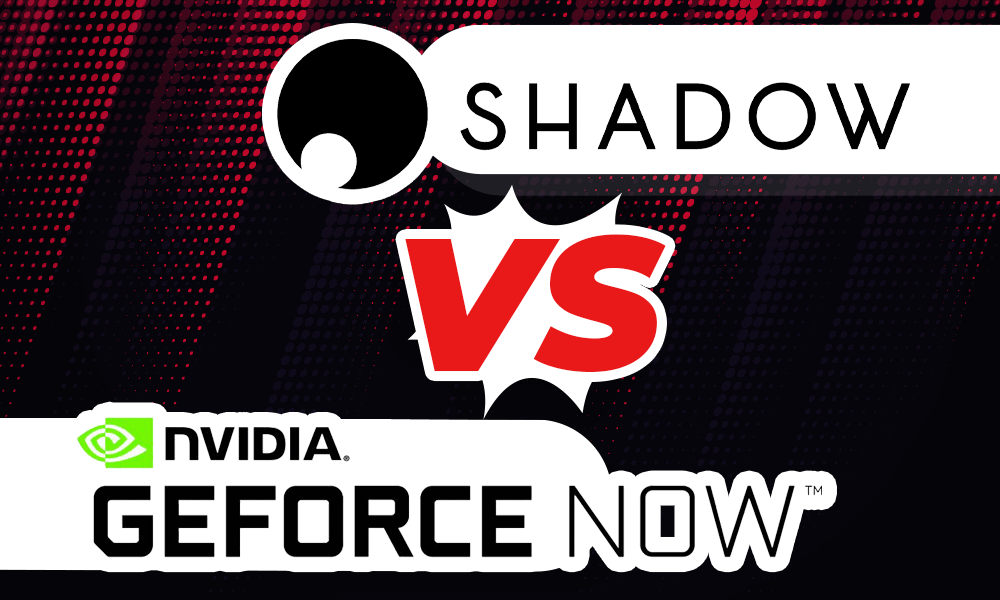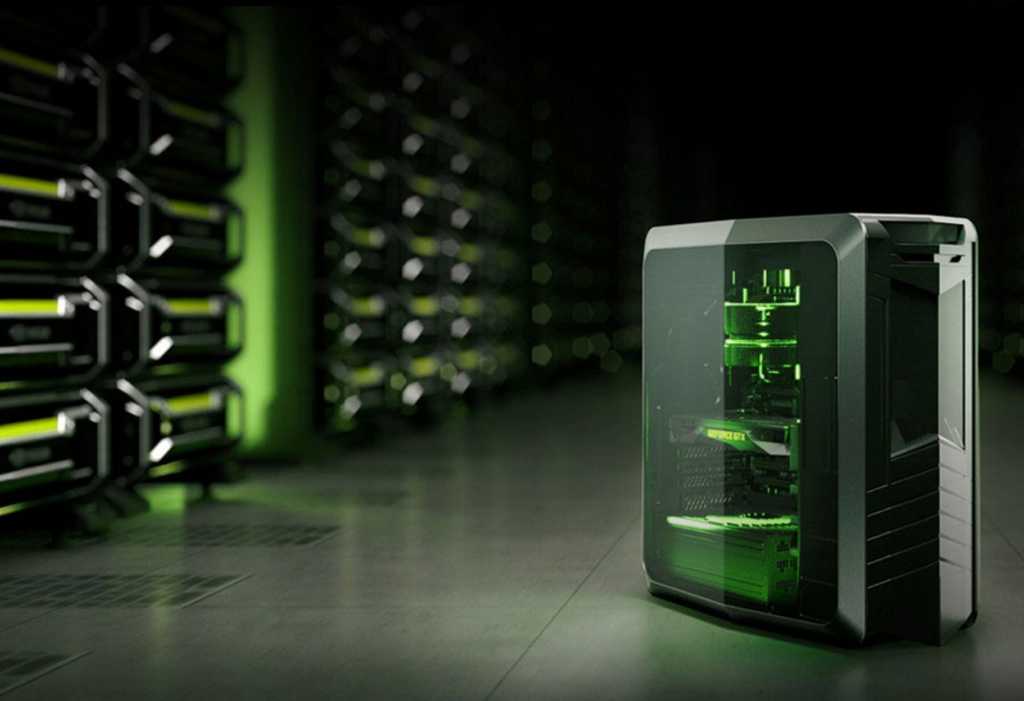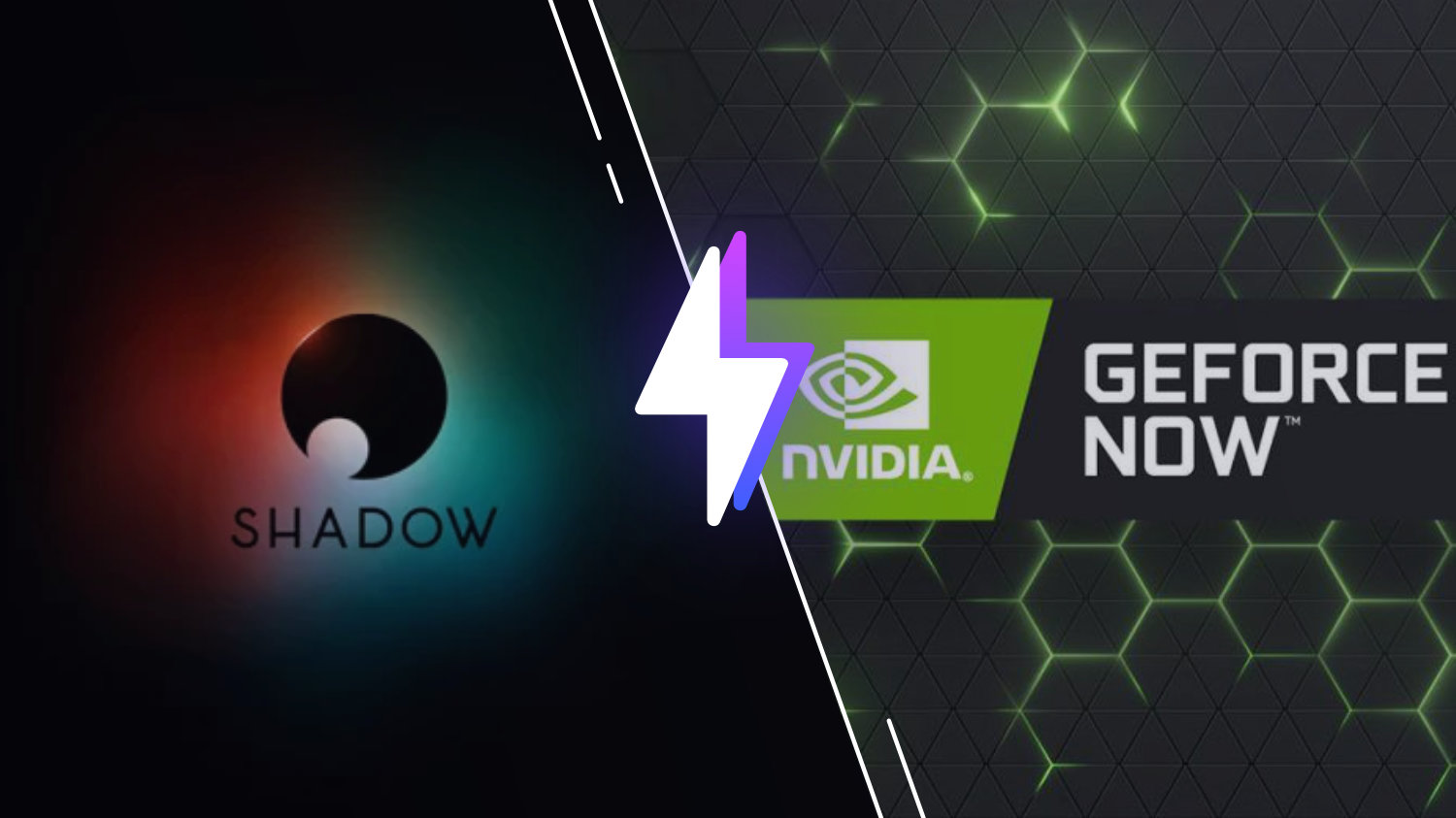Have you ever thought of gaming without boundaries, without the constraints of hardware? Well, in this ever-evolving landscape of gaming, a storm has been brewing – one that could change how we perceive and experience gaming. Welcome to the arena of cloud gaming, a space where heavyweights GeForce Now and Shadow are battling it out to provide you with the ultimate gaming experience.
As they duel to outdo one another, gamers stand on the bluff of a revolution. But which of these titans should you choose? Dive in as we pull back the curtains on these two gaming software, dissecting their every move, and helping you make the ultimate choice. Welcome to the showdown: GeForce Now vs. Shadow.
Understanding GeForce Now

GeForce Now, developed by NVIDIA, is a well-known and robust service. It allows players to access a vast library of games. By leveraging powerful servers, GeForce Now provides seamless gameplay experiences to users regardless of their local hardware capabilities. GeForce Now is a cloud gaming service, allows users to have access to high-performance gaming hardware without the need to invest in expensive equipment themselves.
| Feature | Description |
| Platform | Cloud-based game streaming service |
| Server Locations | Multiple data centers worldwide |
| Supported Devices | PC, Mac, SHIELD TV, Android devices |
| Input Compatibility | Supports most USB or Bluetooth-based keyboard, mouse, and game controllers |
| Streaming Quality | Up to 1080p at 60fps |
| Ray Tracing
Session Length |
Supported on RTX-tier memberships
Free tier: 1-hour sessions; Paid tier: Extended session length |
| Storage | Cloud-based; no local installation required for games |
| Network Requirements | Minimum: 15Mbps for 720p at 60fps; Recommended: 25mbps or higher for 1080p at 60fps |
| Concurrent Sessions | One session per account at a time |
GeForce Now: Gaming Library and Streaming Capabilities
When using GeForce Now, users can stream their favorite games directly to their devices over the internet. This means that the games themselves are being rendered and processed in Nvidia’s data centers, and the resulting video and audio are then transmitted to users’ devices. This eliminates the need for users to have high-end gaming hardware as the data centers handle the heavy lifting.
In order to have an enjoyable gaming experience with GeForce Now, users must have a low-latency network connection. This is crucial as latency plays a significant role in game responsiveness and overall performance. Users should also have a device with the capabilities to handle the gameplay videos being streamed, such as a computer or mobile device with a fast processor and sufficient display capabilities.
Understanding Shadow

Shadow is a cloud gaming service developed by Blade, designed to provide a high-performance gaming experience for users without requiring them to invest in expensive hardware. It is a lesser-known but equally capable service, that delivers a complete virtual Windows 10 PC to its users, allowing them to install and play games from various platforms.
| Feature | Description |
| Platform | Cloud-based full Windows PC experience |
| Server Locations | Multiple data centers in the US and Europe |
| Supported Devices | PC, Mac, iOS, Android, Linux, and some smart TVs |
| Input Compatibility | Supports USB or Bluetooth-based keyboard, mouse, game controllers, and other peripherals |
| Streaming Quality | Up to 4K at 60fps or 1080p at 144fps |
| Hardware | Dedicated GPU, CPU, RAM, and storage for each user |
| Storage | Base storage with options to expand |
| Network Requirements | Minimum: 15Mbps for 1080p; Recommended: 25Mbps for 1080p at 60fps; 50Mbps for 4K |
| Concurrent Sessions | One session per account |
Shadow: Gaming Library and Streaming Capabilities
In order to achieve the best performance, Shadow requires users to have a stable, low-latency internet connection. This ensures that games can be streamed without noticeable lag or reduced quality, allowing the user to enjoy their games as if they were running on a powerful local gaming rig.
Shadow supports a wide array of gaming platforms, including popular launchers like Steam, UPlay, and the Epic Games Store. This gives users access to a large library of games, as well as the ability to use their existing game licenses within the Shadow environment.
Geforce Now vs Shadow: Factor-Based Comparison

In the further article, we are going to configure both software on the basis of affecting factors. Let’s check all that out.
1. Geforce Now vs Shadow: Graphics Performance
When comparing the graphics performance of GeForce Now and Shadow, both services offer high-quality gaming experiences, but they differ in specific GPU capabilities. However, GeForce has a more advanced and newer version.
GeForce Now provides gamers access to powerful NVIDIA GPUs, such as the RTX 2080. This GPU performs exceptionally well and enables an enjoyable gaming experience for users, even on demanding games.
Shadow boasts a dedicated GTX 1080 graphics card for each user. Although this graphics card is slightly older than the RTX 2080 used in GeForce Now, it still delivers remarkable results, allowing users to play games at high settings.
2. Geforce Now vs Shadow: CPU Performance

CPU performance is crucial for gaming, as it determines the smoothness of gameplay and the ability to handle complex game mechanics. Both GeForce Now and Shadow utilize powerful CPUs to provide an optimal gaming experience. But GeForce has some extraordinary power. Let’s check.
GeForce Now‘s CPU, performance tests indicate that GeForce Now offers slightly lower latency than Shadow, which translates to quicker control responses and less noticeable input lag.
In contrast, Shadow’s CPU performance, although having slightly higher latency, still provides an overall smooth and satisfactory experience for gamers. Well, you can check the last of the cloud gaming servers for improved connectivity.
3. Geforce Now vs Shadow: User Interface Comparison
When comparing the user interfaces of GeForce Now and Shadow, it is important to examine their accessibility, ease of use, and the overall experience provided to the users.
GeForce Now features a clean and minimalist interface, focusing on game discovery and launching. The search feature on GeForce Now is fast and efficien. The settings panel is straightforward. The UI is primarily divided into three sections:
- Home, where users can find featured games and news;
- Library, which displays the users’ available games; and
- Store, directing users to various storefronts for game purchases.
Shadow’s user interface focuses on providing a full Windows 10 experience. This approach allows users to access not only games but also productivity, creativity, and entertainment. The main interface of Shadow is relatively simple, presenting the user with a fullscreen. Users can manage their accounts and settings through the Shadow Control Panel.
Result
Shadow’s offering of a full Windows experience may be more suitable for advanced users or those who need a comprehensive solution beyond gaming. In terms of software, GeForce Now comes with pre-installed games and applications, eliminating the need for users to manually install.
4. Geforce Now vs Shadow: Price Evaluation

Comparing the pricing of GeForce Now and Shadow is important for users seeking a cloud gaming solution that offers the best value for their money.
GeForce Now offers two main pricing tiers. They provide a free plan, which gives users a limited time on gaming sessions and 1-hour sessions at a time; however, there might be a waiting time to access a gaming session due to high demand. For a better and more consistent gaming experience, their Premium plan costs $11.99 per month.
On the other hand, Shadow also offers a monthly subscription service. Their plans start at $11.99 per month as well, but they differ from GeForce Now by providing users with a complete Windows 10 gaming PC experience in the cloud. This means that users can install and play any game they wish, without the limitations or waiting times that might be present in GeForce’s free plan.
Result
Both GeForce Now and Shadow have their unique selling points regarding pricing and the services they provide. GeForce Now gives users access to a more limited selection of games in their library, while Shadow offers a full-fledged gaming PC in the cloud. Potential subscribers need to consider their gaming needs.
5. Geforce Now vs Shadow: Gaming Library Analysis
A crucial aspect to consider when comparing cloud gaming services is their respective game libraries.
GeForce Now, by Nvidia, allows its users to play games from a curated library of supported games. This means that NVIDIA works closely with game publishers to ensure compatibility and smooth performance on the platform. The service regularly updates its library and adds new games for subscribers to enjoy.
In contrast, Shadow’s unique approach to cloud gaming allows users to access their own game libraries from popular digital storefronts such as Steam, Epic Games Store, and Uplay. This means that Shadow does not have its own game library, but rather provides an environment for users to play any game.
Which is Better?
| GeForce Now | Shadow |
| Curated Library | User has to make its own |
| Update itself | User have to update |
| Works closely with game publishers | Windows desktop experience |
From the above table, you will get the idea that idea of gaming library in both the applications. Moreover, both the software are highend. So it is advised you to consider your preference while making an informed decision for yourself.
6. Geforce Now vs Shadow: Platform Support and Compatibility

When comparing GeForce Now and Shadow, it’s important to consider each service’s platform support and compatibility. Both cloud gaming services aim to provide a seamless gaming experience across various devices and operating systems.
GeForce Now is designed to be accessible on various platforms, including Windows, macOS, Nvidia Shield, and Android devices. The service even extends its support to iOS through the Safari browser. To deliver optimal performance, users should have a stable internet connection.
Shadow also offers impressive platform support, making it compatible with Windows 10, macOS, iOS, Linux, Android, and Ubuntu devices. Well, it’s essential to have a low-latency network connection for smooth gameplay. You can check our guide to improve latency.
Which is better?
In terms of compatibility, both GeForce Now and Shadow focus on delivering a complete gaming ecosystem. This enables gamers to access and play their favorite games from their existing libraries across multiple platforms. Well, if you are more into cloud computing then you must check about daas.
Frequently Asked Questions
Q1. Which service has better performance, GeForce Now or Shadow?
GeForce Now and Shadow offer reliable cloud gaming experiences, but they differ in performance. GeForce Now focuses on providing easy access to specific games and optimizing the game settings to ensure smooth gameplay. On the other hand, Shadow offers a complete virtual PC on the cloud, giving users more control over settings and game library.
Q2. How do pricing plans compare between GeForce Now and Shadow?
GeForce Now offers a free membership with one-hour gaming sessions, while the paid plans start with the priority membership, which costs around $9.99 per month. The priority membership includes faster access, priority support, and longer session lengths. On the other hand, Shadow has multiple pricing options, starting from $11.99 per month for its entry-tier plan. The higher-priced plans offer faster virtual PCs and additional storage. Keep in mind that pricing may vary by region and any promotional offerings.
Q3. What devices are supported by GeForce Now and Shadow?
Both GeForce Now and Shadow aim to provide access to various devices. GeForce Now supports Windows, macOS, Android, and within the Chrome browser. Meanwhile, Shadow supports Windows, macOS, Linux, Android, iOS, and certain smart TVs. This comprehensive support ensures that most users can enjoy cloud gaming on their preferred devices.
Q4. How stable and reliable are GeForce Now and Shadow services?
Cloud gaming relies on stable internet connections and robust server infrastructure to provide satisfactory gaming experiences. Both GeForce Now and Shadow have tried to ensure high levels of stability and reliability for their users. However, users will get the best experience with a fast, low-latency connection.



